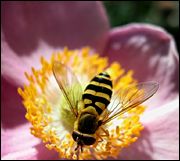The most important relationship I seek to nurture in the treatment room is the one a patient has with their own body. We live in a culture that teaches us to override pain, defer to outside authority, and push through discomfort. Patients often arrive hoping I can “fix” them, but the truth is, we can’t do the work for them. We can offer guidance, insight and support, but healing requires their full participation.
Vitamins, Minerals and Dietary Supplements
Bee Pollen
What is bee pollen? Why do we need it?
Bee pollen is a fine, powder-like substance produced by flowering plants. It functions as the male element in the fertilization of plants, and is often carried and collected by bees returning to their hives. The pollen is then harvested for commercial use. It contains carbohydrates, fats, proteins, and some vitamins and minerals.
Preliminary research from the Ukraine shows that pollen may help people with rheumatoid arthritis, and can treat disorders of the liver, gallbladder, stomach and intestines. Pollen extracts are sometimes used to help desensitize plants to which they are allergic. In addition, melbrosia, a mixture of fermented bee pollen, flower pollen and royal jelly, may treat menopausal symptoms in women, including headaches and urinary incontinence.
How much bee pollen should I take?
 The optimal dose of bee pollen is unknown. However, a generally recommended dose is 500 milligrams, taken two to three times per day.
The optimal dose of bee pollen is unknown. However, a generally recommended dose is 500 milligrams, taken two to three times per day.
What are some good sources of bee pollen? What forms are available?
Most noncultivated flowering plants produce pollen. While it is not clear which plants produce the best pollen, some of the most common pollens used commercially come from timothy crass, corn, rye and pine. Bee pollen is usually harvested directly from bee hives.
What can happen if I don?t get enough bee pollen? What can happen if I take too much? Are there any side-effects I should be aware of?
Because bee pollen is not an essential nutrient, pollen deficiencies do not occur in humans. Many people have allergies to natural pollens that are inhaled; reactions to ingested pollen have also been reported, sometimes with serious consequences. Aside from the allergic reactions, no other significant side-effects have been reported.
As of this writing, there are no known drug interactions with bee pollen. As always, however, make sure to consult with a licensed health care provider before taking bee pollen or any other dietary supplement or herbal remedy.
References
- Kristoffersen K, Thomsen BW, Schacke E, Wagner HH. Use of natural medicines in women referred to specialists. Ugeskr Laeger 1997;159:294?6 [in Danish].
- Szanto E, Gruber D, Sator M, et al. Placebo-controlled study of melbrosia in treatment of climacteric symptoms. Wien Med Wochenschr 1994;144:130?3 [in German].
- Mansfield LE, Goldstein GB. Anaphylactic reaction after ingestion of local bee pollen. Ann Allergy 1981;47:154?6.
- Voloshyn OI, Pishak OV, Seniuk BP, et al. The efficacy of flower pollen in patients with rheumatoid arthritis and concomitant diseases of the gastroduodenal and hepatobiliary systems. Likarska Sprava 1998;4:151?4 [in Ukrainian].
- Vourdas D, Syrigou E, Potamianou P, et al. Double-blind, placebo-controlled evaluation of sublingual immunotherapy with standardized olive pollen extract in pediatric patients with allergic rhinoconjunctivitis and mild asthma due to olive pollen sensitization. Allergy 1998;53:662?72.


